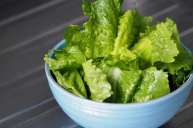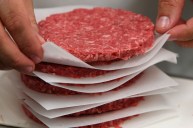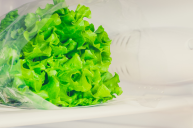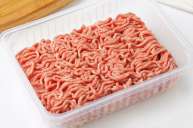If you think that just because your food came from the grocery store it is safe, I hate to be the bearer of bad news. Even when foods are in the organized, lined shelves of your local grocery store they still carry the risk of containing bacteria. A food safety expert shares the grocery store foods that pose the biggest risk of E.coli. You may want to grab a pen and paper to jot this down for the next time you go shopping.
Videos by Wide Open Country
Grocery Store Foods That Pose Biggest Risk Of E. Coli

It turns out that McDonald's is not the only place that you can get E.coli from. Common foods at the grocery store can also be linked to food-borne illnesses. Some of the food items on the list may surprise you. One of the most common grocery store foods that poses the biggest risk of E. coli is pre-washed greens.
That's right, those bags that say "washed and ready to eat", you may want to think twice before trusting them. The director of Institute for Food Safety and Nutrition Security at George Washington University said, " produce that claims to be pre-washed — such as lettuce, vegetables, or even cut fruit — should be avoided, as it can be a breeding ground for bacteria."
While it may seem like a time saving alternative, getting E.coli is not worth the risk. Instead of buying those bagged and "washed" greens buy the real thing. For example, buy an entire head of lettuce and wash it yourself then pat dry with paper towels.
However, the whole head of lettuce isn't safe from E.coli either. The director further explained that if "any leaf is torn or damaged, I [meaning herself] just throw it away, because that's how the bacteria can get in there." So when buying your produce you want to be extra vigilient on the quality to best protect yourself from harmful bacteria like E. coli..
But Wait There Is More

Greens are not the only thing to be aware of in the grocery store. There are more grocery store foods that pose a risk of E. coli. One of them being cantaloupe. Darin Detwiler, a Northeastern University professor of food regulatory policy says, "Cantaloupe's webbed rind can trap bacteria." She adds that you "can't clean the outside enough." I don't know about you, but that is enough to make me avoid the fruit all together.
Cantaloupe is not the only fruit in question. Most fruit, if it sits out for too long, poses the same risk of exposing you to E. coli. Also, you would never be able to tell by looking at the produce. The outward appearance of the fruit or vegetable doesn't change. So if you think you would be able to tell, I hate to be the bearer of bad news yet again.
While it may seem "cleaner" coming from a grocery store rather than a farmer's stand or the ground, it is actually the opposite. Dan Schaffner, a food and science professor at Rutgers University warned, "the more food is processed from the farm to your table, the more risk there is for it to be introduced to bacteria."




